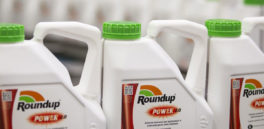As indicated by the ruling that sentenced Monsanto in the United States, in our country and in the world .Why the SENASA has to take note and act in result. The e-mails that reveal that the company hides information on the toxicity of its products.
By Anabel Pomar for www.monsantopapers.lavaca.org
The sentencing ruling from last August 10th in the Dewayne Johnson v. Monsanto Company case, marks a hard setback for the company now property of Bayer. It is an unprecedented judicial precedent that alerts about the hazard of Roundup by shedding light -supported by solid evidence- on the way in which the company hid information and influenced the regulating agencies to keep its product in the market.
In Argentina, it is the National Service of Heath and Agrofood Quality (SENASA for the acronym in Spanish) depending from the Agroindustry portfolio, which authorizes these chemical products, based on the safety studies carried out by the same companies who produce them. Different researches show that these regulating agencies work in collusion with the companies and do not fulfill their role of protecting public health. After the USA sentence, is it valid to continue keeping the “innocuous” label with which Roundup is commercialized in our country?
Argentina holds the sad record of using 350 million liters per year of this substance, which is already present in food, rivers and even rain water.
In the text of the verdict of the recent trial, Monsanto was found guilty of acting in a premeditated or abusive manner by hiding the risk in the design of two of its glyphosate-based herbicides. “The Roundup Pro® or Ranger Pro® entailed possible risks that were known or could be known in the light of the scientific knowledge generally accepted by the scientific community at the time of its production, distribution or sale”, affirmed the jury holding their verdict on the evidence submitted by the defense and supported in the internal documents of Monsanto itself.
Many of the tests are part of what is known as the Monsanto Papers: thousands and thousands of documents obtained by the NGO USRTK, through public information requests and by lawyers of different cases against Roundup in the more than 4,000 lawsuits awaiting for their turn in the court. Documents which Lavaca.org makes available from a special site monsantopapers.lavaca.org for the right to information.
“You cannot say that Roundup is not a carcinogen”, wrote the toxicologist at Monsanto, Donna farmer, in an a-mail dated 11/22/2003. “We have not made the necessary testing on the formulation to make that statement”, she concludes.
Monsanto Argentina assures on its webpage “that glyphosate , when used correctly, does not entail a risk for human health, wild life or the environment.” After the sentence, in addition to stating they would appeal the decision of the jury, they reassured in the media that their products were safe.
Glyphosate was classified in 2015 by the IARC (United Nations International Research for Cancer) as genotoxic, carcinogenic for animals and probably for humans. As documented in the Monsanto Papers, the EPA shall have to explain the relationship with the company, suspicions of influencing the negotiations of the EFSA (although the European regulating agency denied it in a report) and on other agencies such as the Agency for Toxic Substances and the Disease Registry, ASTDR, a public health federal agency of the Department of Health and Human Services of the United States, to prevent that this new carcinogenic hazard status from moving to other places.
Brent Wisner, the attorney representing many of the cancer victims who are suing Monsanto, said that the documents offer solid evidence of inappropriate connections between the EPA and the chemical company, in an effort to avoid new safety revisions after the recategorization of the IARC. “I believe it is very clear that the officials of the EPA and the employees of Monsanto worked together to achieve the goal of stopping an analysis by the ATSDR”, stated Wisner. The ASTDR planned to update a safety audit of the glyphosate which was believed would be in line with the decision by the IARC. The study was “hold up” after conversations between Monsanto employees and the EPA employee, Jess Rowland, who openly offered in an e-mail, in April 2015, his availability to stop the revision by the ATSDR. Rowland, who retired in 2016, was the sub-director of the division within the division of health effects of the Office of Pesticide Programs (OPP) of the EPA. The suspicious and close relation between Rowland and Monsanto has brought about an investigation from the Inspector General Office of the EPA in the USA.
Internal documents of this agency show that the EPA, in March and April 2016, was “fighting” internally to manage to gather the data on the ingredients that Monsanto has commonly used to formulate its herbicides. Despite Monsanto has been selling Roundup herbicides for more than 40 years, the internal documents of the agency indicate that the EPA had information, loose, partial and unorganized about these formulations.
The need to revise which papers and which certifications the permit to enter our country is based on is compelling. The sentence and the revelations from the Monsanto papers show that when Monsanto assured that its products had been authorized more than 40 years ago for carrying no danger, is hiding information. The very researchers of the company admit in e-mails that they have not carried out the necessary tests to make that statement.
Monsanto’s strategies to defend the Roundup have been revealed in internal e-mails, presentations and memos. Even worse, these documents suggest that the company did not even seem to know whether Roundup is harmless for the people’s health. “It cannot be stated that Roundup is not carcinogenic”, wrote Monsanto’s toxicologist Donna Farmer, in one of her e-mails. “We have not carried out the necessary studies on the formulation to make such statement.” The e-mail, sent on November 22, 2003, in one of the pieces of evidence used in the Dewayne Johnson case.
That same affirmation, that there were not enough studies to state that Roundup is not carcinogenic, was read by several Monsanto employees eight years ago, on December 14, 2010. The e-mail exchange -in some of which Monsanto’s President in Argentina, Juan Farinati, is present or copied- ends admitting the lack of studies. In that final copy appear as recipients for the branch in Argentina, Martín Lasarte and Diego Kavanas, among other people connected to the company.
With the SUBJECT: Re: Response Need – Re: Glyphosate Questions (Argentina); FW publicaciones CASAFE, the last e-mail answers, among others, these questions: “Why are Roundup formulas not carcinogenic? Which are the more relevant metabolites and which studies show they are not (carcinogenic)?
Stephen Adams, Chemistry Regulatory Affairs Manager of Monsanto Company, confirms in the answer the same information as Donna Farmer’s (also copied in this e-mail) The formula of its star product was never tested; only its component separately but never the final formulation which is what they sell. Textually in English: “With regards to the carcinogenicity of our formulations, we don´t have such testing on them directly, but we do have such testing on the glyphosate component and some extensive tox testing on the surfactant.”
Today, 8 years after that e-mail, having that information, the public speech of the company is still the same. “Those that were certified as safe for the environment and human health are the only ones that go out to the market”, can be read in the Monsanto Argentina webpage, not informing about what the company knows in accordance with the text of the abovementioned internal e-mail.
The first statements by SENASA after the verdict, in an article dated August 17 by iprofesional, they dismissed the seriousness of the conclusion that arose from the lawsuit and that was ruled against the company. “It is a lawsuit between individuals. The user of a product goes against the company, and what took place is a first-instance sentence. So far, in the documents and studies that all the government agencies have, even the SENASA, there are no reasons to change the situation of the glyphosate”, they assure from Monsanto in the five most common questions on Glyphosate on their website.
The papers of the very same company published in MonsantoPapers refute this affirmation and the statement made by Donna Farmer, in the tenth day of the trial which took place in San Francisco and that declared Monsanto guilty of all charges. In addition, there are proven campaigns to interfere or discredit the science that contradict what Monsanto keeps repeating and the “scientific” studies on toxicity ghost-written by the very employees of the company, which support its innocuity and are used as “independent science.”
All this information must be analyzed and cannot be left aside to decide on the use of these agrochemicals in Argentina. It is time the SENASA took note and fulfilled its role of protecting the Argentine society and guaranteeing the right to information and to health.


